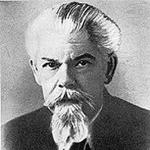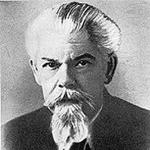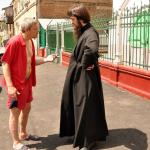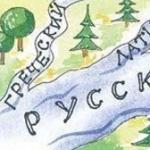The female part of our multinational people, together with men, children and the elderly, endured all the hardships on their shoulders great war. Women wrote many glorious pages in the annals of the war.
Women were on the front line: doctors, pilots, snipers, in air defense units, signalmen, scouts, drivers, topographers, reporters, even tankers, artillerymen and served in the infantry. Women actively participated in the underground, in the partisan movement.
Women took on many “purely male” specialties in the rear, as the men went to war, and someone had to stand at the machine, drive a tractor, become a lineman railways, master the profession of a metallurgist, etc.
Figures and facts
Military service in the USSR is an honorable duty not only for men, but also for women. This right is written in Art. 13th Universal Law military service, adopted by the IV session of the Supreme Soviet of the USSR on September 1, 1939. It says that the People's Commissariats of Defense and the Navy are given the right to take women with medical, veterinary and special technical training into the army and navy, as well as recruit them for training fees. In wartime, women with this training may be drafted into the army and navy for auxiliary and special service. The feeling of pride and gratitude of Soviet women to the party and government regarding the decision of the session of the Supreme Soviet of the USSR was expressed by the deputy of the Supreme Soviet of the USSR E.M. Kozhushina from the Vinnitsa region: “All of us, young patriots,” she said, “are ready to defend our beautiful Motherland. We women are proud that we have been given the right to protect her on an equal footing with men. And if our party, our government calls, then we will all defend our wonderful country and give the enemy a crushing rebuff.”
Already the first news of Germany's perfidious attack on the USSR aroused in women boundless anger and burning hatred for enemies. At meetings and rallies held throughout the country, they declared their readiness to stand up for their homeland. Women and girls went to the party and Komsomol organizations, to the military commissariats, and there they persistently sought to be sent to the front. Among the volunteers who applied to be sent to the active army, up to 50% of the applications were from women.
During the first week of the war, applications for sending to the front were received from 20,000 Muscovites, and three months later, 8,360 women and girls of Moscow achieved admission to the ranks of the defenders of the Motherland. Among the Leningrad Komsomol members who filed applications in the first days of the war with a request to be sent to the army, 27 thousand applications were from girls. More than 5,000 girls from the Moskovsky district of Leningrad were sent to the front. 2 thousand of them became fighters of the Leningrad Front and selflessly fought on the outskirts of their native city.

Rosa Shanina. Destroyed 54 enemies.
Created June 30, 1941 State Committee Defense (GKO) adopted a number of resolutions on the mobilization of women to serve in the air defense forces, communications, internal security, on military highways ... Several Komsomol mobilizations were carried out, in particular, the mobilization of Komsomol women in Navy, in the Air Force and signal troops.
In July 1941, over 4 thousand women Krasnodar Territory asked to be sent to the active army. In the first days of the war, 4,000 women from the Ivanovo region volunteered. About 4,000 girls from the Chita region, more than 10,000 from Karaganda, became Red Army soldiers on Komsomol vouchers.
At the front in different periods fought from 600 thousand to 1 million women, 80 thousand of them were Soviet officers.
The Central Women's School of Sniper Training provided the front with 1,061 snipers and 407 sniper instructors. School graduates destroyed over 11,280 enemy soldiers and officers during the war.
At the end of 1942, the Ryazan Infantry School was ordered to train about 1,500 officers from female volunteers. By January 1943, over 2,000 women had arrived at the school.
For the first time in years Patriotic War in the Armed Forces of our country, women's combat formations appeared. Of the female volunteers, 3 aviation regiments were formed: the 46th Guards Night Bomber, 125th Guards Bomber, 586th Air Defense Fighter Regiment; Separate Women's Volunteer Rifle Brigade, Separate Women's Reserve Rifle Regiment, Central Women's Sniper School, Separate Women's Company of Sailors.

Snipers Faina Yakimova, Roza Shanina, Lidia Volodina.
Being near Moscow, the 1st Separate Women's Reserve Regiment also trained cadres of motorists and snipers, machine gunners and junior commanders of combat units. There were 2899 women in the personnel.
20,000 women served in the Special Moscow Air Defense Army.
Some women were also commanders. Can you name a hero? Soviet Union Valentina Grizodubova, who throughout the war commanded the 101st long-range aviation regiment, where men served. She herself made about two hundred sorties, delivering explosives, food to the partisans, and taking out the wounded.
Colonel-engineer Antonina Pristavko was the head of the ammunition department of the artillery department of the army of the Polish Army. She ended the war near Berlin. Among her awards are the orders: "Rebirth of Poland" IV class, "Grunwald Cross" III class, "Golden Cross of Merit" and others.
In the first war year of 1941, 19 million women were employed in agricultural work, mainly on collective farms. This means that almost all the burdens of providing food for the army and the country fell on their shoulders, on their laboring hands.
5 million women were employed in industry, and many of them were also entrusted with command posts - directors, heads of workshops, foremen.
Culture, education, health care have become a matter of concern, mainly for women.
Ninety-five women in our country have the high title of Heroes of the Soviet Union. Among them are our astronauts.
The largest representation of participants in the Great Patriotic War among other specialties were female doctors.
From total number doctors, of which there were about 700 thousand in the active army, 42% were women, and among surgeons - 43.4%.
More than 2 million people served as middle and junior medical workers at the fronts. Women (medical assistants, sisters, medical instructors) made up the majority - over 80 percent.
During the war years, a coherent system of medical and sanitary services for the fighting army was created. There was the so-called doctrine of military field medicine. At all stages of the evacuation of the wounded - from the company (battalion) to the hospitals of the deep rear - female doctors selflessly carried out the noble mission of mercy.
Glorious patriots served in all branches of the military - in aviation and marines, on warships of the Black Sea Fleet, Northern Fleet, Caspian and Dnieper flotillas, in floating naval hospitals and sanitary trains. Together with the horsemen, they went into deep raids behind enemy lines, were in partisan detachments. With the infantry they reached Berlin. And everywhere the doctors provided specialized assistance to those injured in the battles.
It is estimated that the female medical instructors of rifle companies, medical battalions, and artillery batteries helped seventy percent of the wounded soldiers return to duty.
For special courage and heroism, 15 female doctors were awarded the title of Hero of the Soviet Union.
The sculptural monument in Kaluga reminds of the feat of women - military doctors. In the park on Kirov Street, on a high pedestal, a front-line nurse in a raincoat, with a sanitary bag over her shoulder, rises to her full height. The city of Kaluga during the war years was the focus of numerous hospitals, which cured and returned to service tens of thousands of soldiers and commanders. That is why they built a monument in a holy place, which always has flowers.
History has not yet known such a massive participation of women in the armed struggle for the Motherland, which was shown by Soviet women during the Great Patriotic War. Having achieved enrollment in the ranks of the soldiers of the Red Army, women and girls mastered almost all military specialties and, together with their husbands, fathers and brothers, served in all military branches of the Soviet Armed Forces.
Unknown Soviet female soldiers from an anti-tank artillery unit.
3.8 (75.56%) 45 votesWomen captured by the Germans. How the Nazis mocked captured Soviet women
Second World War rolled over humanity. Millions of dead and many more crippled lives and destinies. All the belligerents did truly monstrous things, justifying everything with war.
Carefully! The material presented in the collection may seem unpleasant or intimidating.
Of course, the Nazis were especially distinguished in this regard, and this is not even taking into account the Holocaust. There are many both documented and frankly fictional stories about what the German soldiers did.
One of the high-ranking German officers recalled the briefings they went through. Interestingly, there was only one order regarding female soldiers: “Shoot.”

Most did so, but among the dead, the bodies of women in the form of the Red Army are often found - soldiers, nurses or nurses, on whose bodies there were traces of cruel torture.

Residents of the village of Smagleevka, for example, say that when they had Nazis, they found a seriously wounded girl. And in spite of everything they dragged her onto the road, stripped her and shot her.
We recommend reading 

But before her death, she was tortured for a long time for pleasure. Her entire body was turned into a continuous bloody mess. The Nazis did the same with female partisans. Before being executed, they could be stripped naked and kept in the cold for a long time.
Women soldiers of the Red Army in captivity and the Germans 1 part

Of course, the captives were constantly raped.
Women soldiers of the Red Army captured by the Finns and Germans part 2. Jews
And if the highest German ranks were forbidden to have an intimate relationship with the captives, then ordinary privates had more freedom in this matter.
And if the girl did not die after a whole company used her, then she was simply shot.

The situation in the concentration camps was even worse. Unless the girl was lucky and someone from higher ranks camp took her to him as a servant. Although it did not save much from rape.

In this regard, camp No. 337 was the most cruel place. There, the prisoners were kept naked for hours in the cold, hundreds of people were settled in the barracks at once, and anyone who could not do the work was immediately killed. About 700 prisoners of war were destroyed daily in the Stalag.

Women were subjected to the same torture as men, and even much worse. In terms of torture, the Nazis could be envied by the Spanish Inquisition.
Soviet soldiers knew exactly what was happening in the concentration camps and what the threat of captivity was. Therefore, no one wanted to give up and was not going to. They fought to the end, until death, she was the only winner in those terrible years.
Blessed memory of all those who died in the war ...
Many Soviet women who served in the Red Army were ready to commit suicide so as not to be captured. Violence, bullying, painful executions - such a fate awaited most of the captured nurses, signalmen, intelligence officers. Only a few ended up in prisoner-of-war camps, but even there their situation was often even worse than that of Red Army men.
During the Great Patriotic War, more than 800 thousand women fought in the ranks of the Red Army. The Germans equated Soviet nurses, intelligence officers, snipers with partisans and did not consider them military personnel. Therefore, the German command did not apply to them even those few international rules treatment of prisoners of war who acted against Soviet male soldiers.

In materials Nuremberg Trials the order that was in force throughout the war was preserved: to shoot all "commissars who can be recognized by the Soviet star on their sleeves and Russian women in uniform."
The execution most often completed a series of bullying: women were beaten, brutally raped, and curses were carved on their bodies. The bodies were often stripped and thrown away without even thinking about burial. In the book of Aron Schneer, the testimony of a German soldier Hans Rudhoff, who in 1942 saw dead Soviet nurses, is given: “They were shot and thrown onto the road. They lay naked."
Svetlana Aleksievich in the book “War has no female face” quotes the memoirs of one of the female soldiers. According to her, they always kept two cartridges for themselves in order to shoot themselves, and not be captured. The second cartridge is in case of a misfire. The same participant in the war recalled what happened to the captured nineteen-year-old nurse. When they found her, her chest was cut off and her eyes were gouged out: “They put her on a stake ... Frost, and she is white-white, and her hair is all gray.” In the backpack, the deceased girl had letters from home and a children's toy.

SS-Obergruppenführer Friedrich Jeckeln, known for his cruelty, equated women with commissars and Jews. All of them, according to his order, were supposed to be interrogated with passion and then shot.
Women soldiers in the camps
Those women who managed to escape execution were sent to camps. Almost constant violence awaited them there. Especially cruel were the policemen and those male prisoners of war who agreed to work for the Nazis and joined the camp guards. Women were often given to them "as a reward" for their service.
The camps often lacked elementary living conditions. The prisoners of the Ravensbrück concentration camp tried to make their existence as easy as possible: they washed their hair with ersatz coffee that was given out for breakfast, they secretly made their own combs.
According to regulations international law, prisoners of war could not be involved in work in military factories. But this was not applied to women. In 1943, the captured Elizaveta Klemm tried on behalf of a group of prisoners to protest the decision of the Germans to send Soviet women to the factory. In response to this, the authorities first beat everyone, and then herded them into a cramped room where it was impossible even to move.

In Ravensbrück, female prisoners of war sewed uniforms for the German troops and worked in the infirmary. In April 1943, the famous “protest march” took place there: the camp authorities wanted to punish the recalcitrants who invoked the Geneva Convention and demanded that they be treated as prisoners of war. The women were to march through the camp. And they marched. But not doomed, but chasing a step, as in a parade, in a slender column, with the song “ Holy war". The effect of punishment turned out to be the opposite: they wanted to humiliate women, but instead they received evidence of intransigence and fortitude.
In 1942, Elena Zaitseva, a nurse, was taken prisoner near Kharkov. She was pregnant, but hid it from the Germans. She was selected to work at a military factory in Neusen. The working day lasted 12 hours, they spent the night in the workshop on wooden plank beds. The prisoners were fed turnips and potatoes. Zaitseva worked until childbirth, nuns from a nearby monastery helped to take them. The newborn was given to the nuns, and the mother returned to work. After the end of the war, mother and daughter managed to reunite. But there are few such stories with happy endings.

Only in 1944 was a special circular issued by the Chief of the Security Police and the SD on the treatment of female prisoners of war. They, like other Soviet prisoners, were to be subjected to a police check. If it turned out that a woman was “politically unreliable”, then the status of a prisoner of war was removed from her and she was handed over to the security police. The rest were sent to concentration camps. In fact, this was the first document in which women who served in the Soviet army were equated with male prisoners of war.
"Unreliable" after interrogations were sent to execution. In 1944, a female major was brought to the Stutthof concentration camp. Even in the crematorium, they continued to mock her until she spat in the German's face. After that, she was pushed alive into the furnace.

There were cases when women were released from the camp and transferred to the status of civilian workers. But it is difficult to say what was the percentage of those actually released. Aron Schneer notes that in the cards of many Jewish prisoners of war, the entry “released and sent to the labor exchange” actually meant something completely different. They were formally released, but in fact they were transferred from the Stalags to concentration camps, where they were executed.
After captivity
Some women managed to escape from captivity and even return to the unit. But being in captivity changed them irreversibly. Valentina Kostromitina, who served as a medical instructor, recalled her friend Musa, who had been in captivity. She was "terribly afraid to go into the landing, because she was in captivity." She never managed to "cross the bridge on the pier and board the boat." The stories of a friend made such an impression that Kostromitina was afraid of captivity even more than bombing.
A considerable number of Soviet women prisoners of war after the camps could not have children. Often they were experimented on, subjected to forced sterilization.
Those who survived to the end of the war were under pressure from their own: often women were reproached for surviving captivity. They were expected to commit suicide but not surrender. At the same time, even the fact that many did not have any weapons with them at the time of captivity was not taken into account.
During the Great Patriotic War, such a phenomenon as collaborationism was also widespread.
The question of whether and today is the subject of study for historians.
“Daughter, I have collected a bundle for you. Go away... Go away... You have two more younger sisters growing up. Who will marry them? Everyone knows that you were at the front for four years, with men…”. The truth about women in the war, which was not written in the newspapers ...
On Victory Day, blogger radulova published the memoirs of women veterans from the book by Svetlana Aleksievich.
“We drove for many days ... We went out with the girls to some station with a bucket to get water. They looked around and gasped: one by one the trains went, and there were only girls. They sing. They wave to us - some with headscarves, some caps. It became clear: there are not enough men, they died in the ground. Or in captivity. Now we are instead of them ... Mom wrote me a prayer. I put it in a locket. Maybe it helped - I returned home. I kissed the medallion before the fight…”
“Once at night, a whole company conducted reconnaissance in combat in the sector of our regiment. By dawn, she moved away, and a groan was heard from the neutral zone. Left wounded. “Don’t go, they’ll kill you,” the fighters didn’t let me in, “you see, it’s already dawn.” Didn't listen, crawled. She found the wounded man, dragged him for eight hours, tying his hand with a belt. Dragged alive. The commander found out, hastily announced five days of arrest for unauthorized absence. And the deputy commander of the regiment reacted differently: "Deserves an award." At the age of nineteen I had a medal "For Courage". She turned gray at nineteen. At the age of nineteen, in the last battle, both lungs were shot, the second bullet went between two vertebrae. My legs were paralyzed... And I was considered murdered... At the age of nineteen... My granddaughter is like that now. I look at her and I don't believe it. Baby!”
“I had night duty… I went into the ward for the seriously wounded. The captain is lying… The doctors warned me before the shift that he would die at night… He would not make it until the morning… I asked him: “Well, how? How can I help you?" I will never forget… He suddenly smiled, such a bright smile on his exhausted face: “Unbutton your robe… Show me your chest… I haven’t seen my wife for a long time…” I felt ashamed, I answered him something. She left and came back an hour later. He lies dead. And that smile on his face…”
…………………………………………………………………….
“And when he appeared for the third time, this is one instant - he will appear, then he will disappear, - I decided to shoot. I made up my mind, and suddenly such a thought flashed through: this is a man, even though he is an enemy, but a man, and my hands somehow began to tremble, a shiver went through my whole body, chills. Some kind of fear… Sometimes in a dream this feeling comes back to me… After the plywood targets, it was difficult to shoot at a living person. I see him in optical sight I see well. It’s as if he’s close… And inside of me something resists… Something won’t let me, I can’t make up my mind. But I pulled myself together, pulled the trigger ... We did not succeed right away. It's not a woman's job to hate and kill. Not ours... We had to convince ourselves. Persuade…"
“And the girls rushed to the front voluntarily, but a coward will not go to war on his own. They were brave, extraordinary girls. There are statistics: the losses among the doctors of the front line took second place after the losses in the rifle battalions. In the infantry. What is, for example, to pull the wounded from the battlefield? I'll tell you now ... We went on the attack, and let's mow us down with a machine gun. And the battalion was gone. Everyone was lying down. They were not all killed, many were wounded. The Germans are beating, the fire does not stop. Quite unexpectedly for everyone, first one girl jumps out of the trench, then a second, a third ... They began to bandage and drag the wounded away, even the Germans were dumbfounded for a while. By ten o'clock in the evening, all the girls were seriously injured, and each saved a maximum of two or three people. They were rewarded sparingly, at the beginning of the war they were not scattered with awards. It was necessary to pull out the wounded man along with his personal weapon. The first question in the medical battalion: where are the weapons? At the beginning of the war it was not enough. A rifle, a machine gun, a machine gun - this also had to be dragged. In the forty-first, order number two hundred and eighty-one was issued on the presentation for an award for saving the lives of soldiers: for fifteen seriously wounded, carried out from the battlefield along with personal weapons - the medal "For Military Merit", for saving twenty-five people - the Order of the Red Star, for the salvation of forty - the Order of the Red Banner, for the salvation of eighty - the Order of Lenin. And I described to you what it meant to save at least one in battle ... From under the bullets ... "
“What was going on in our souls, such people as we were then, probably, will never be again. Never! So naive and so sincere. With such faith! When our regiment commander received the banner and gave the command: “Regiment, under the banner! On your knees!”, we all felt happy. We stand and cry, each with a tear in our eyes. You won’t believe it now, because of this shock my whole body tensed up, my illness, and I fell ill with “night blindness”, it happened to me from malnutrition, from nervous overwork, and so, my night blindness has passed. You see, the next day I was healthy, I recovered, through such a shock to my whole soul ... ”
…………………………………………
“I was thrown by a hurricane wave to brick wall. She lost consciousness… When she came to, it was already evening. She raised her head, tried to squeeze her fingers - they seemed to be moving, barely pierced her left eye and went to the department, covered in blood. In the corridor I meet our older sister, she did not recognize me, she asked: “Who are you? Where?" She came closer, gasped and said: “Where have you been carried for so long, Ksenya? The wounded are hungry, but you are not.” Bandaged head quickly left hand above the elbow, and I went to get dinner. His eyes were dark, sweat was pouring down. She began to distribute dinner, fell. Brought to consciousness, and only heard: “Hurry! Hurry!” And again - "Hurry! Hurry!” A few days later, they took blood from me for the seriously wounded.”
“We are very young and went to the front. Girls. I even grew up for the war. Mom measured at home ... I grew ten centimeters ... ”
……………………………………
“We organized a nursing course, and my father took my sister and me there. I am fifteen years old and my sister is fourteen. He said: “This is all I can give to win. My girls…” There was no other thought then. A year later, I got to the front ... "
……………………………………
“Our mother had no sons… And when Stalingrad was besieged, we voluntarily went to the front. Together. The whole family: mother and five daughters, and father had already fought by this time ... ”
………………………………………..
“I was mobilized, I was a doctor. I left with a sense of duty. And my dad was happy that his daughter was at the front. Defends the Motherland. Dad went to the draft board early in the morning. He went to get my certificate and went early in the morning on purpose so that everyone in the village could see that his daughter was at the front ... ”
……………………………………….
“I remember they let me go on leave. Before I went to my aunt, I went to the store. Before the war, she was terribly fond of sweets. I say:
- Give me candy.
The saleswoman looks at me like I'm crazy. I didn’t understand: what are cards, what is a blockade? All the people in line turned to me, and I have a bigger rifle than me. When we were given them, I looked and thought: “When will I grow up to this rifle?” And all of a sudden they began to ask, the whole queue:
- Give her candy. Cut out our coupons.
And they gave it to me."
“And for the first time in my life it happened ... Our ... Female ... I saw blood in myself, as I scream:
- I got hurt...
In intelligence with us was a paramedic, already an elderly man. He to me:
- Where did you hurt?
- I don’t know where ... But the blood ...
He, like a father, told me everything ... I went to intelligence after the war for fifteen years. Every night. And the dreams are like this: sometimes my machine gun failed, then we were surrounded. You wake up - your teeth creak. Do you remember where are you? There or here?”
…………………………………………..
“I left for the front as a materialist. Atheist. She left as a good Soviet schoolgirl, who was well taught. And there ... There I began to pray ... I always prayed before the fight, read my prayers. The words are simple... My words... There is only one meaning, so that I return to my mom and dad. I didn’t know real prayers, and I didn’t read the Bible. Nobody saw me pray. I am secret. I prayed furtively. Carefully. Because… We were different then, other people lived then. You understand?"
“Form on us could not be attacked: always in the blood. My first wounded man was Senior Lieutenant Belov, my last wounded man was Sergei Petrovich Trofimov, a mortar platoon sergeant. In the seventieth year, he came to visit me, and I showed my daughters his wounded head, on which there is still a large scar. In total, I carried four hundred and eighty-one wounded out of the fire. One of the journalists calculated: a whole rifle battalion ... They dragged men on themselves, two or three times heavier than us. And the wounded are even worse. You are dragging him and his weapons, and he is also wearing an overcoat and boots. You take eighty kilograms on yourself and drag. You lose... You go for the next one, and again seventy-eighty kilograms... And so five or six times in one attack. And in you yourself forty-eight kilograms - ballet weight. I can't believe it now...”
……………………………………
“I then became a squad leader. All department from young boys. We are on the boat all day. The boat is small, there are no latrines. If necessary, the guys can go overboard, and that's it. Well, how about me? A couple of times I got to the point that I jumped right overboard and swim. They yell, "Sergeant major overboard!" They'll pull it out. Here is such an elementary trifle ... But what is this trifle? I then treated...
………………………………………
“I returned from the war gray-haired. Twenty-one years old, and I'm all white. I had a serious injury, a concussion, I could not hear well in one ear. Mom met me with the words: “I believed that you would come. I prayed for you day and night.” My brother died at the front. She cried: "It's the same now - give birth to girls or boys."
“But I’ll say something else… The worst thing for me in the war is to wear men’s underpants. That was scary. And this is somehow for me ... I won’t express myself ... Well, firstly, it’s very ugly ... You are in the war, you are going to die for the Motherland, and you are wearing men’s shorts. In general, you look funny. Ridiculous. Men's shorts were then worn long. Wide. Sewn from satin. Ten girls in our dugout, and they are all in men's briefs. Oh my goodness! Winter and summer. Four years… They crossed the Soviet border… They finished off, as our commissar used to say at political classes, the beast in its own lair. Near the first Polish village, we were changed, given new uniforms and... And! AND! AND! Brought for the first time woman pants and bras. For the first time in the whole war. Ha-ah... Well, of course... We saw normal lingerie... Why aren't you laughing? Crying… Well, why?”
……………………………………..
“At the age of eighteen Kursk Bulge I was awarded the medal "For Military Merit" and the Order of the Red Star, at the age of nineteen - the Order of the Patriotic War of the second degree. When new recruits arrived, the guys were all young, of course, they were surprised. They are also eighteen or nineteen years old, and they mockingly asked: “What did you get your medals for?” or “Have you been in combat?” They pester with jokes: “Do the bullets pierce the armor of the tank?” I later bandaged one of these on the battlefield, under fire, and I remembered his last name - Dapper. He had a broken leg. I put a tire on him, and he asks for forgiveness from me: “Sister, I’m sorry that I offended you then ...”
“Disguised. We are sitting. We are waiting for the night to still make an attempt to break through. And Lieutenant Misha T., the battalion commander was wounded, and he served as a battalion commander, he was twenty years old, began to remember how he loved to dance and play the guitar. Then he asks:
- Have you ever tried?
- What? What have you tried? - And I wanted to eat terribly.
- Not what, but whom ... Babu!
And before the war, cakes were like that. With such a name.
- No-o-o...
And I haven't tried either. If you die and don't know what love is... They'll kill us at night...
- Go ahead, you fool! “I figured out what he was talking about.
They died for life, not yet knowing what life is. Everything else has only been read in books. I love movies about love…”
…………………………………………
“She shielded a loved one from a fragment of a mine. Fragments fly - these are some fractions of a second ... How did she manage? She saved Lieutenant Petya Boychevsky, she loved him. And he stayed alive. Thirty years later, Petya Boychevsky came from Krasnodar and found me at our front-line meeting, and told me all this. We went with him to Borisov and found the clearing where Tonya died. He took the earth from her grave... He carried it and kissed it... There were five of us, Konakovo girls... And I returned to my mother alone...”
……………………………………………
“A separate smoke masking detachment was organized, commanded by the former commander of the torpedo boat division, Captain-Lieutenant Alexander Bogdanov. Girls, mostly with a secondary technical education or after the first courses of the institute. Our task is to protect the ships, cover them with smoke. The shelling will begin, the sailors are waiting: “I wish the girls hung the smoke. It's easier with him." They drove out in cars with a special mixture, and at that time everyone hid in a bomb shelter. We, as they say, called fire upon ourselves. The Germans were hitting this smokescreen…”
“I am bandaging a tanker… The battle is on, the roar is on. He asks: “Girl, what is your name?” Even a compliment. It was so strange for me to pronounce my name in this roar, in this horror - Olya.
………………………………………
“And now I am the commander of the gun. And, therefore, me - in one thousand three hundred and fifty-seventh anti-aircraft regiment. At first, blood was flowing from the nose and ears, indigestion set in completely ... The throat dried up to vomiting ... At night it’s not so scary, but during the day it’s very scary. It seems that the plane is flying right at you, exactly at your gun. Ramming at you! This is one moment ... Now it will turn all, all of you into nothing. Everything is the end!”
…………………………………….
“And while they found me, I got severe frostbite on my legs. Apparently, I was covered with snow, but I was breathing, and a hole formed in the snow ... Such a tube ... Sanitary dogs found me. They dug up the snow and brought my hat with earflaps. There I had a death passport, everyone had such passports: what relatives, where to report. They dug me up, put me on a raincoat, there was a full coat of blood ... But no one paid attention to my legs ... I was in the hospital for six months. They wanted to amputate a leg, amputate above the knee, because gangrene was starting. And here I was a little faint-hearted, I did not want to remain a cripple. Why should I live? Who needs me? Neither father nor mother. A burden in life. Well, who needs me, stump! I will suffocate…”
………………………………………
“They got a tank there. We were both senior drivers, and there should only be one driver in a tank. The command decided to appoint me as the commander of the IS-122 tank, and my husband as a senior driver. And so we came to Germany. Both are wounded. We have awards. There were a lot of tank girls in medium tanks, but in heavy tanks, I was the only one.”
“We were told to put on all the military, and I'm a meter fifty. I got into trousers, and the girls upstairs tied me up with them.
…………………………………..
“While he hears ... Until the last moment you tell him that no, no, how can you die. Kiss him, hug him: what are you, what are you? He is already dead, his eyes are on the ceiling, and I whisper something else to him ... I reassure him ... The names are now erased, gone from memory, but the faces remain ... "
…………………………………
“We had a nurse captured… A day later, when we recaptured that village, dead horses, motorcycles, and armored personnel carriers lay everywhere. They found her: her eyes were gouged out, her chest was cut off… They put her on a stake… It was cold, and she was white and white, and her hair was all gray. She was nineteen years old. In her backpack we found letters from home and a green rubber bird. Children's toy…”
……………………………….
“Near Sevsk, the Germans attacked us seven to eight times a day. And even that day I carried out the wounded with their weapons. I crawled up to the last one, and his arm was completely broken. Dangling in pieces... On the veins... All covered in blood... He urgently needs to cut off his hand in order to bandage it. No other way. I don't have a knife or scissors. The bag telepals-telepalsya on its side, and they fell out. What to do? And I gnawed this pulp with my teeth. I gnawed it, bandaged it ... I bandage it, and the wounded man: “Hurry, sister. I will fight again.” In a fever…”
“I was afraid throughout the war that my legs would not be crippled. I had beautiful legs. Man - what? He is not so afraid even if he loses his legs. Still, a hero. Groom! And a woman will be crippled, so her fate will be decided. Women's fate ... "
…………………………………
“The men will make a fire at the bus stop, shake the lice, dry themselves. Where are we? Let's run for some shelter, and undress there. I had a knitted sweater, so lice sat on every millimeter, in every loop. Look, it's boring. There are head lice, body lice, pubic lice ... I had them all ... ”
………………………………….
“Near Makiivka, in the Donbass, I was wounded, wounded in the thigh. Such a fragment, like a pebble, climbed in, sitting. I feel - blood, I put an individual package there too. And then I run, bandaging. I'm ashamed to tell anyone, the girl was wounded, but where - in the buttock. In the ass ... At sixteen, it's embarrassing to tell anyone. It's embarrassing to admit. Well, and so I ran, bandaged, until I lost consciousness from loss of blood. Full boots leaked…”
………………………………….
“The doctor came, they did a cardiogram, and they ask me:
- When did you have a heart attack?
- What heart attack?
- Your heart is in scars.
And these scars, apparently, from the war. You go over the target, you are shaking all over. The whole body is covered with trembling, because there is fire below: fighters are shooting, anti-aircraft guns are shooting ... We mostly flew at night. For some time they tried to send us on assignments during the day, but they immediately abandoned this idea. Our “Po-2s” were shot from a machine gun… They made up to twelve sorties a night. I saw the famous ace pilot Pokryshkin when he flew in from a combat flight. He was a strong man, he was not twenty or twenty-three years old, like us: while the plane was being refueled, the technician had time to take off his shirt and unscrew it. She was dripping, as if he'd been out in the rain. Now you can easily imagine what happened to us. You arrive and you can’t even get out of the cabin, they pulled us out. They could no longer carry the tablet, they pulled it along the ground.
………………………………
“We aspired ... We did not want to be said about us: “Oh, these women!” And we tried harder than men, we still had to prove that we were no worse than men. And for a long time there was an arrogant, condescending attitude towards us: “These women will fight…”
“Three times wounded and three times shell-shocked. In the war, who dreamed of what: who would return home, who would reach Berlin, and I thought of one thing - to live to see my birthday, so that I would be eighteen years old. For some reason, I was afraid to die earlier, not even live to be eighteen. I went in trousers, in a cap, always torn, because you always crawl on your knees, and even under the weight of the wounded. I could not believe that someday it would be possible to get up and walk on the ground, and not crawl. It was a dream! Once a division commander arrived, saw me and asked: “What kind of teenager is this? What are you holding him? He should be sent to study.”
…………………………………
“We were happy when we got a pot of water to wash our hair. If they walked for a long time, they looked for soft grass. They tore her and her legs ... Well, you see, they washed off with grass ... We had our own characteristics, girls ... The army didn’t think about it ... Our legs were green ... It’s good if the foreman was an elderly man and understood everything, didn’t take excess linen from the knapsack, and if young, be sure to throw out the excess. And how superfluous it is for girls who need to change clothes twice a day. We tore the sleeves off our undershirts, and there were only two of them. It's only four sleeves…”
“Let's go ... A man of two hundred girls, and behind a man of two hundred men. The heat is worth it. Hot Summer. March throw - thirty kilometers. Wild heat... And after us, red spots on the sand... Red footprints... Well, these things... Ours... How can you hide something here? The soldiers follow and pretend that they do not notice anything ... They do not look under their feet ... Our trousers withered, as if they were made of glass. They cut it. There were wounds, and the smell of blood could be heard all the time. They didn’t give us anything ... We guarded: when the soldiers would hang their shirts on the bushes. We’ll steal a couple of pieces ... Later they already guessed, laughed: “Sergeant, give us another linen. The girls took ours." There was not enough cotton wool and bandages for the wounded... But not that... Women's underwear, perhaps, only appeared two years later. We walked in men's shorts and T-shirts ... Well, let's go ... In boots! The legs are fried too. Let's go ... To the crossing, ferries are waiting there. We got to the crossing, and then they started bombing us. The bombing is terrible, the men - who where to hide. They call us ... But we don’t hear the bombing, we don’t care about the bombing, we’re more likely to go to the river. To the water... Water! Water! And they sat there until they got wet ... Under the fragments ... Here it is ... It was a shame worse than death. And a few girls died in the water…”
“Finally got an appointment. They brought me to my platoon... The soldiers look: some with mockery, some even with evil, and the other shrug his shoulders like that - everything is immediately clear. When the battalion commander introduced that, they say, you have a new platoon commander, everyone immediately howled: “Uuuuuuuuuuuuu…” One even spat: “Ugh!” And a year later, when I was awarded the Order of the Red Star, these same guys, who survived, carried me in their arms to my dugout. They were proud of me."
……………………………………..
“We went on a mission with an accelerated march. The weather was warm, we walked light. When the positions of long-distance artillerymen began to pass, suddenly one jumped out of the trench and shouted: “Air! Frame!" I raised my head and searched the sky for a “frame”. I don't see any aircraft. All around is quiet, no sound. Where is that "frame"? Then one of my sappers asked permission to get out of the line. I see, he goes to that gunner and gives him a slap in the face. Before I could think of anything, the artilleryman shouted: “Boys, they are beating us!” Other gunners jumped out of the trench and surrounded our sapper. My platoon, without hesitation, threw probes, mine detectors, knapsacks and rushed to his rescue. A fight ensued. I couldn't understand what happened? Why did the platoon get into a fight? Every minute counts, and here is such a mess. I give the command: “Platoon, get in line!” Nobody pays attention to me. Then I pulled out my gun and fired into the air. Officers jumped out of the dugout. While everyone was calmed down, a considerable time passed. The captain came up to my platoon and asked: “Who is in charge here?” I reported. His eyes widened, he was even confused. Then he asked: “What happened here?” I couldn't answer because I didn't really know the reason. Then my platoon commander came out and told how it all happened. So I learned what “frame” is, what an offensive word it was for a woman. Something like a whore. Frontline curse…”
“Are you asking about love? I am not afraid to tell the truth ... I was a page, what stands for “field wife. Wife at war. Second. Illegal. The first battalion commander... I didn't like him. He was a good man, but I didn't like him. And I went to him in a dugout a few months later. Where to go? There are only men around, so it's better to live with one than to be afraid of everyone. In battle, it was not as scary as after the battle, especially when we had a rest, we would retreat to re-form. How they shoot, fire, they call: “Sister! Sister!”, and after the battle, everyone guards you… You won’t get out of the dugout at night… Did the other girls tell you this or didn’t they admit it? We were ashamed, I think ... They kept silent. Proud! But it was all there... But they are silent about it... It is not accepted... No... For example, there was one woman in the battalion, she lived in a common dugout. Together with men. They gave me a place, but what a separate place it is, the whole dugout is six meters. I woke up at night from the fact that I waved my arms, then I would give one on the cheeks, on the hands, then the other. I was wounded, ended up in the hospital and waved my arms there. The nanny will wake you up at night: “What are you doing?” Who will you tell?”
…………………………………
“We buried him… He was lying on a raincoat, he had just been killed. The Germans are firing at us. It is necessary to bury quickly... Right now... We found old birch trees, chose the one that stood at a distance from the old oak. The biggest. Near it ... I tried to remember so that I could return and find this place later. Here the village ends, here is a fork ... But how to remember? How to remember if one birch is already burning before our eyes ... How? They began to say goodbye ... They say to me: “You are the first!” My heart jumped, I realized ... What ... Everyone, it turns out, knows about my love. Everyone knows… The thought hit: maybe he knew? Here... He lies... Now they will lower him into the ground... They will bury him. They'll cover it with sand... But I was terribly glad at this thought, which, perhaps, he also knew. What if he liked me too? As if he is alive and will answer me something now ... I remembered how New Year he gave me a German chocolate bar. I didn’t eat it for a month, I carried it in my pocket. Now it doesn’t reach me, I remember all my life ... This moment ... Bombs are flying ... He ... Lies on a raincoat ... This moment ... And I rejoice ... I stand and smile to myself. Abnormal. I am glad that he, perhaps, knew about my love ... She came up and kissed him. Never kissed a man before… It was the first…”
“How did the Motherland meet us? I can’t live without sobs… Forty years have passed, and my cheeks are still burning. The men were silent, and the women… They shouted to us: “We know what you were doing there! They lured young p ... our men. Front-line b… Military bitches…” They insulted me in every way… The Russian dictionary is rich… A guy from the dance escorts me, I suddenly feel bad, bad, my heart rumbles. I go and go and sit in a snowdrift. "What happened to you?" - "Never mind. Danced." And these are my two wounds... This is war... And you have to learn to be gentle. To be weak and fragile, and her legs in boots were spread - the fortieth size. It's unusual for someone to hug me. I got used to taking responsibility for myself. She waited for tender words, but did not understand them. They are like children to me. At the front among men - a strong Russian mat. Got used to it. A friend taught me, she worked in the library: “Read poetry. Yesenin read.
“The legs were gone… The legs were cut off… They rescued me in the same place, in the forest… The operation was in the most primitive conditions. They put me on the table to operate, and there was not even iodine, they sawed my legs with a simple saw, both legs ... They put me on the table, and there was no iodine. Six kilometers to another partisan detachment let's go for iodine, and I'm lying on the table. Without anesthesia. Without ... Instead of anesthesia - a bottle of moonshine. There was nothing but an ordinary saw… A carpenter's saw… We had a surgeon, he himself was also without legs, he spoke about me, it was other doctors who said: “I bow to her. I have operated on so many men, but I have not seen such men. Don't scream." I held on… I used to be strong in public…”
……………………………………..
She ran to the car, opened the door and began to report:
- Comrade General, on your orders...
Heard:
- Set aside...
Stretched out at attention. The general did not even turn to me, but through the glass of the car he was looking at the road. Nervous and often looks at the clock. I am standing. He addresses his orderly:
- Where is the commander of the sappers?
I tried again to report:
- Comrade General...
He finally turned to me and with annoyance:
- The hell I need you!
I understood everything and almost burst out laughing. Then his orderly was the first to guess:
- Comrade General, maybe she is the commander of the sappers?
The general glared at me.
- Who are you?
- Sapper platoon commander, Comrade General.
Are you a platoon leader? he was indignant.
- Are your sappers working?
- That's right, Comrade General!
- I got it: general, general ...
He got out of the car, walked a few steps forward, then came back to me. He stood and closed his eyes. And to his orderly:
……………………………………….
“My husband was the head machinist, and I was the machinist. We traveled in a wagon for four years, and our son was with us. He never even saw a cat in my entire war. When I caught a cat near Kyiv, our train was terribly bombed, five planes flew in, and he hugged her: “Dear kitty, how glad I am that I saw you. I don't see anyone, well, sit with me. Let me kiss you." A child ... A child should have everything childish ... He fell asleep with the words: “Mommy, we have a cat. We now have a real home.”
“Anya Kaburova is lying on the grass ... Our signalman. She dies - a bullet hit her in the heart. At this time, a wedge of cranes flies over us. Everyone raised their heads to the sky, and she opened her eyes. She looked: "What a pity, girls." Then she paused and smiled at us: “Girls, am I really going to die?” At this time, our postman, our Klava, is running, she is shouting: “Don't die! Do not die! You have a letter from home…” Anya does not close her eyes, she is waiting… Our Klava sat down next to her and opened the envelope. A letter from my mother: “My dear, beloved daughter ...” A doctor is standing next to me, he says: “This is a miracle. Miracle!! She lives contrary to all the laws of medicine…” They finished reading the letter… And only then Anya closed her eyes…”
…………………………………
“I stayed with him for one day, the second and I decide: “Go to the headquarters and report. I'll stay here with you." He went to the authorities, but I was not breathing: well, how would they say that at twenty-four hours her leg was gone? This is the front, that's understandable. And suddenly I see - the authorities are going to the dugout: a major, a colonel. Everyone greets by the hand. Then, of course, we sat down in the dugout, drank, and each said his word that the wife found her husband in the trench, this is a real wife, there are documents. This is such a woman! Let's see this woman! They said such words, they all cried. I remember that evening all my life ... What else do I have left? Registered as a nurse. I went with him to investigate. The mortar hits, I see it has fallen. I think: killed or wounded? I run there, and the mortar hits, and the commander shouts: “Where are you going, damn woman!!” I’ll crawl - alive ... Alive! ”
…………………………………
“Two years ago, our chief of staff, Ivan Mikhailovich Grinko, visited me. He has been retired for a long time. Sitting at the same table. I also baked pies. They talk with her husband, remember... They started talking about our girls... And I, like a glow: “Honor, speak, respect. And the girls are almost all single. Single. They live in communal apartments. Who took pity on them? Protected? Where did you all go after the war? Traitors!!” In a word, I spoiled their festive mood ... The chief of staff was sitting in your place. “Show me,” he pounded his fist on the table, “who offended you. Just show me!” He asked for forgiveness: “Valya, I can’t tell you anything except tears.”
………………………………..
“I reached Berlin with the army ... I returned to my village with two Orders of Glory and medals. I lived for three days, and on the fourth day my mother lifts me out of bed and says: “Daughter, I have collected a bundle for you. Go away... Go away... You have two more younger sisters growing up. Who will marry them? Everyone knows that you were at the front for four years, with men…” Don't touch my soul. Write, like others, about my awards ... "
………………………………..
“Near Stalingrad… I am dragging two wounded. I'll drag one - I leave, then - the other. And so I pull them in turn, because they are very seriously wounded, they cannot be left, both of them, as it is easier to explain, their legs are beaten off high, they bleed. Here a minute is precious, every minute. And suddenly, when I crawled away from the battle, there was less smoke, suddenly I find that I am dragging one of our tankers and one German ... I was horrified: ours are dying there, and I am saving the German. I was in a panic… There, in the smoke, I didn’t understand… I see: a man is dying, a man is screaming… Ahhh… They are both burnt, black. The same. And then I saw: someone else's locket, someone else's watch, everything is someone else's. This form is cursed. And now what? I pull our wounded man and think: “Should we return for the German or not?” I understood that if I left him, he would soon die. From loss of blood ... And I crawled after him. I continued to drag them both... This is Stalingrad... The most terrible battles. The best of the best. You are my diamond... There cannot be one heart for hate, and the second for love. Man has only one."
“The war ended, they were terribly unprotected. Here is my wife. She is a smart woman, and she treats military girls badly. He believes that they were going to the war for suitors, that everyone was spinning novels there. Although in fact, we have a sincere conversation, it was most often honest girls. Clean. But after the war... After the dirt, after the lice, after the deaths... I wanted something beautiful. Bright. Beautiful women... I had a friend, he was loved at the front by a beautiful, as I now understand, girl. Nurse. But he did not marry her, was demobilized and found himself another, prettier one. And he is unhappy with his wife. Now he remembers that, his military love, she would be his friend. And after the front, he did not want to marry her, because for four years he saw her only in worn out boots and a man's padded jacket. We tried to forget the war. And they also forgot their girls ... "
…………………………………..
“My friend… I won’t give her last name, she’ll suddenly be offended… A military assistant… She was wounded three times. The war ended, entered medical institute. She did not find any of her relatives, they all died. She was terribly poor, washing the porches at night to feed herself. But she did not admit to anyone that she was a war invalid and had benefits, she tore all the documents. I ask: "Why did you break?" She cries: “And who would marry me?” “Well, well,” I say, “I did the right thing.” He cries even louder: “I could use these papers now. I'm seriously ill." Can you imagine? Crying."
…………………………………….
“We went to Kineshma, this Ivanovo region, to his parents. I rode a heroine, I never thought that it was possible to meet a front-line girl like that. We have gone through so much, saved so many children for mothers, husbands' wives. And suddenly ... I recognized the insult, I heard hurtful words. Before that, except for: “dear sister”, “dear sister”, I didn’t hear anything else ... They sat down to drink tea in the evening, the mother took her son to the kitchen and cries: “Who did you marry? At the front… You have two younger sisters. Who will marry them now? And now, when I think about it, I want to cry. Imagine: I brought a record, I loved it very much. There were such words: and you are rightfully supposed to walk in the most fashionable shoes ... This is about a front-line girl. I put it elder sister came up and smashed it in front of my eyes, saying that you have no rights. They destroyed all my front-line photographs ... Enough for us, front-line girls. And after the war we got it, after the war we had another war. Also terrible. Somehow the men left us. They didn't cover it. It was different at the front."
……………………………………
“It was then that they began to honor us, thirty years later ... Invite us to meetings ... And at first we hid, we didn’t even wear awards. The men wore it, the women didn't. Men are winners, heroes, suitors, they had a war, but they looked at us with completely different eyes. Quite different... We, I tell you, they took away the victory... The victory was not shared with us. And it was a shame ... It is not clear ... "
…………………………………..
“The first medal “For Courage”… The battle began. Heavy fire. The soldiers lay down. Team: “Forward! For the Motherland! ”, And they lie. Again the team, again lie. I took off my hat so that they could see: the girl got up ... And they all got up, and we went into battle ... ”
November 26, 2014military history knows many cases of cruelty, deceit and betrayal.
Some cases are striking in their scale, others in their belief in absolute impunity, one thing is clear: for some reason, some people who find themselves in harsh military conditions for some reason decide that the law is not written for them, and they have the right to control other people's destinies, forcing people to suffer .
Below are some of the most eerie realities that took place during wartime.
1. Nazi baby factories
The photo below shows the rite of baptism of a small child who was "bred out" by Aryan selection.
During the ceremony, one of the SS men holds a dagger over the baby, and the newly-made mother gives the Nazis an oath of allegiance.
It is important to note that this baby was one of tens of thousands of babies who participated in the project. Lebensborn. However, not all children received life in this children's factory, some were kidnapped, and they were only raised there.
Factory of true Aryans
The Nazis believed that the Aryans blonde hair and blue eyes few in the world, and therefore it was decided, by the way, by the same people who were responsible for the Holocaust, to launch the Lebensborn project, which dealt breeding purebred Aryans, which in the future were to join the Nazi ranks.
It was planned to settle the children in beautiful houses, which were appropriated after the mass extermination of Jews.
And it all started with the fact that after the occupation of Europe, mixing with the indigenous people was actively encouraged among the SS. The main thing that the number of the Nordic race grew.
pregnant unmarried girls, within the framework of the "Lebensborn" program, were placed in houses with all amenities, where they gave birth and raised their children. Thanks to such care during the war years, it was possible to grow from 16,000 to 20,000 Nazis.
But, as it turned out later, this amount was not enough, so other measures were taken. The Nazis began to forcibly take away from their mothers children who had desired color hair and eyes.
It is worth adding that many of the assigned children were orphans. Of course, light color skin and the absence of parents is not an excuse for the activities of the Nazis, but, nevertheless, at that difficult time, the children had something to eat and a roof over their heads.
Some parents gave up their children to avoid ending their lives in gas chamber. Those who most suited the given parameters were selected literally immediately, without further persuasion.
At the same time, no genetic examinations were carried out, children were selected based only on visual information. Those selected were included in the program, or they were sent to some German family. Those who did not fit ended their lives in concentration camps.
The Poles say that because of this program, the country has lost about 200,000 children. But it's unlikely to ever know exact figure, because many kids have successfully settled down in German families.
Brutality during the war
2. Hungarian angels of death
Do not think that only the Nazis committed atrocities during the war. The pedestal of perverted war nightmares was shared with them by ordinary Hungarian women.
It turns out that to commit crimes it is not at all necessary to serve in the army. These dear guardians of the home front, having combined their efforts, sent almost three hundred people to the next world.
It all started during the First World War. It was then that many women living in the village of Nagiryov, whose husbands had gone to the front, began to take an interest in the prisoners of war of the Allied armies who were located nearby.
Women liked this kind of affair, and prisoners of war, apparently, too. But when their husbands began to return from the war, something abnormal began to happen. One by one the soldiers died. Because of this, the village got the name "murder area".
The killings began in 1911, when a midwife named Fuzekas appeared in the village. She taught women who were temporarily left without husbands, get rid of the consequences of contact with lovers.
After the soldiers began to return from the war, the midwife suggested that the wives boil sticky paper designed to kill flies to get arsenic, and then add it to food.
Arsenic
Thus, they were able to commit a huge number of murders, and women remained unpunished due to the fact that the village official was the brother of the midwife, and in all the death certificates of the victims he wrote "not killed."
The method gained such strong popularity that almost any, even the most insignificant problem, began to be solved with the help of soup with arsenic. When the neighboring settlements finally realized what was happening, fifty criminals managed to kill three hundred people, including objectionable husbands, lovers, parents, children, relatives and neighbors.
Human hunting
3. Parts of the human body as a trophy
It is important to say that during the war, many countries conducted propaganda among their soldiers, in which it was implanted in their brains that the enemy was not a person.
Distinguished in this respect and the American soldiers, whose psyche was influenced very actively. Among them were the so-called "hunting licenses.
One of them went like this: Japanese hunting season is open! There are no restrictions! Hunters get rewarded! Free ammo and equipment! Join the US Marine Corps!
Therefore, there is nothing surprising in the fact that American soldiers during the battle of Guadalcanal (Guadalcanal), killing the Japanese, cut off their ears and kept them as souvenirs.
Moreover, necklaces were made from the teeth of the dead, their skulls were sent home as memorable gifts, and the ears were often worn around the neck or on a belt.

















